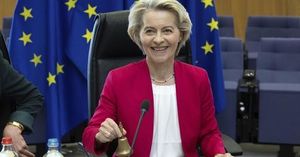Russia's economic situation is taking center stage as the country faces mounting pressure from inflation and the consequences of its prolonged military engagement. Just recently, the Central Bank of Russia implemented a dramatic increase to its key interest rate, which now stands at 21 percent -- the highest level recorded since the establishment of the policy. This decision, announced on October 25, reflects the central bank's urgent attempts to combat inflation, which has surged significantly alongside increased government spending tied to the military conflict.
The rate hike, soaring from 19 percent, is particularly alarming to economists and analysts who fear it might exacerbate existing economic woes. Following this latest adjustment, inflation rates have now jumped from 7.7 percent to 9.8 percent, prompting criticism from various quarters. Underlying this inflation is the stark reality of Russia's economy struggling to keep pace with the surging demand influenced by military spending and economic mismanagement.
Since the onset of the war with Ukraine, Western sanctions have imposed additional strains on Russia's economy, isolations compounded by rising expenses associated with military operations. Notably, the Institute for the Study of War (ISW) recently assessed the grim state of Russia’s economy, indicating it is nearing a "burnout" point. The rising costs of maintaining this war are seen as unsustainable, contributing significantly to fears of economic collapse if the situation continues unaddressed.
The urgency of the economic situation was highlighted by Elvira Nabiullina, governor of the Central Bank, who felt compelled to take drastic measures. Despite facing widespread discontent among politicians and analysts over high interest rates, Nabiullina maintains this strategy is necessary to stabilize prices and manage rampant inflation. Her challenge now lies not only in curbing inflation but also fostering conditions conducive to economic growth.
Critics from within the government are already expressing outrage, with some calling for Nabiullina's resignation. This internal strife speaks volumes about the prevailing dissatisfaction with Putin's economic strategy as many officials begin to openly question the efficacy of the current monetary policies. They worry this pressure could lead to instability within the Kremlin, as senior officials voice their concerns about the general wellbeing of the economy.
The dilemma users face as heavy government military spending pushes inflation higher becomes increasingly apparent. Sergey Chemezov, who is closely aligned to Putin and heads the state-owned defense contractor Rostec, warned of potential bankruptcies among companies unable to cope with current borrowing costs. His assertion—that profit margins are eclipsed by exorbitant borrowing rates—highlights the precarious balance many Russian businesses must now navigate.
While the economic picture might seem bleak, it’s also nuanced. Despite these pressures, reports indicate Russia's economy grew by 4.4 percent during the second quarter of the year, and unemployment remained low at 2.4 percent. The efforts to bolster oil and gas exports, even when curtailed by Western caps, continue to prop up state revenue. Russian exports, utilizing non-Western vessels to bypass sanctions, have successfully attained large earnings from oil sales, contributing to government finances even as international business exits the market.
It doesn’t stop there—many factories are now operating at near-full capacity, primarily focused on military goods manufacturing, which mitigates some of the foreign panic. This growth, juxtaposed with other factors, creates a complex and often contradictory economic environment where inflation thrives alongside industrial productivity.
Still, the surge of inflation driven by military expenditures and domestic demand mismatch raises pressing concerns about sustainability. Analysts are noting this does not just affect commodities but trickles down to everyday essentials, with some basic goods, such as butter, exhibiting dramatic price increases—a staggering 20 percent hike—resulting from supply shortages and panic buying.
With inflation expected to roll back to target levels only by 2025, the Bank of Russia's monetary policies will be continually questioned. According to forecasts, the Central Bank aims to stabilize inflation to around 4.5–5 percent but these targets are viewed skeptically by many experts. If the current fiscal strategies fail to curtail inflation effectively, they risk creating broader economic instability—a ticking clock many are increasingly uneasy about.
Despite its challenges, the Kremlin remains focused on sustaining and even potentially increasing military activity, leveraging economic outputs to fortify its military operations. This juggling act, bringing the economy on one side and the war effort on the other, presents significant challenges for Putin as he navigates the increasingly fiery political waters at home.
The current economic crisis has compounded the uncertainties facing the Russian state, complicated by international dynamics and domestic pressures. The balance between maintaining the war and managing internal dissent is precarious. With analysts warning of dire consequences if the economic slowdown persists, it poses the ultimate test for Putin's leadership and the stability of his regime. The road moving forward promises to be tumultuous as the Kremlin grapples with fundamental questions impacting the nation's future.
Through sustained scrutiny of the central bank and mounting political pressure within, the fate of Russia's economy is very likely tied to the decisions made within the Kremlin—an intersection of fiscal policy and wartime measures. For now, the global community watches closely as the situation unfurls, with the world readying itself for whatever shift may come next from this pivotal region.



